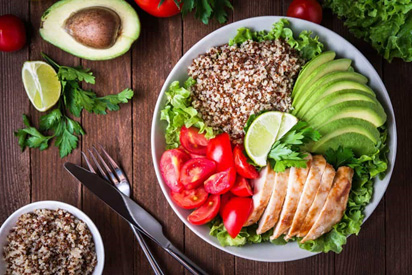When you are planning to undergo surgery, or are recovering from a medical procedure, there are strategies you can use to invest in a healthy, rapid recovery. Think of joint replacement surgery like a marathon. To prepare, you would train and follow tips from your coach, so you are ready to perform at your best. If you are not well conditioned, you are not going to perform well. Surgery is much the same.
During surgery, the human body undergoes surgical stress. Surgical stress can impair the body's ability to nourish cells and heal. It can lead to weight and muscle loss, inflammation, poor wound healing, and complications like infections. Over the years, research has shown that following a nutritional regime, in the weeks and days before and after surgery, can help reduce these risks and set patients up for a quick and complete recovery.
If you or a loved one requires joint replacement surgery, consider increasing your nutrition knowledge and incorporating a few of our tips to help improve your post-surgery recovery time.
First and foremost, dial-in your nutrition
To support recovery, try eating more high-quality proteins and whole unprocessed foods before and after surgery. What consists of good nutrition before surgery? A lot depends on your age, procedure, and general health. If you are concerned, you might not be able to eat well before and after surgery, talk to our Ortho Nurse Navigator, your PCP, or dietitian. They can help you determine your body's energy needs, and tell you which foods to eat before your surgery and which to avoid.
 Meet your nutrition needs before and after joint replacement surgery to help you get back on your feet!
Meet your nutrition needs before and after joint replacement surgery to help you get back on your feet!
Getting enough protein and calories will help you:
- Heal and recover faster
- Leave the hospital sooner
- Reduce your risk of complications after surgery
- Keep up your strength and energy
We sometime suggest nutrition drinks or oral nutrition supplements that can provide extra calories and nutrients to help meet your nutrition needs. These high-energy, high-protein drinks and supplements will help to prepare and protect your muscles and body tissues before and after surgery. When you are researching protein drinks or bars, please read the nutrition label. Look for products that have at least 20 grams of protein and no more than 10 grams of total carbohydrates (sugar). Please talk with your primary care provider about which drinks or supplements are right for you and your medical needs.
Some we like:
Premier Protein, Owyn Protein Shake, Ensure Max Protein, and Quest Protein. Available at most pharmacies, Sam's Club, or Costco.

Your diet should include low fat foods, limit processed foods, and have 65 to 75 grams of proteins per day. Foods rich in protein include meat, seafood, eggs, milk, poultry, cottage cheese and yogurt. Plant based proteins include lentils, chickpeas, tofu, edamame, nuts, quinoa, seeds and beans. Though it may be a little difficult to maintain this diet immediately after the surgery, the process gradually becomes easier after a few months. Your primary care provider may also suggest some eating guidelines that will help you cope with your surgery:
- Eat slowly and chew your food thoroughly.
- Avoid food that is difficult to chew and swallow.
- Eat small proportions of a balanced diet.
- Avoid carbonated drinks, chewing gums and ice as it may cause discomfort to the stomach by letting in too much air.
- Alcoholic beverages should be avoided.
In most cases, it is also suggest that you take calcium, vitamin and mineral supplements after surgery to avoid nutrient deficiencies and associated diseases.
Nutrition and Diabetes
Most healthcare providers will say, “Watch your sugar intake,” but sugar can be hard to recognize. Most people know to stay away from surgery drinks, but how about white bread, white rice and pasta? Anything with refined flour will spike your blood sugar.
Nothing is completely off-limits. Even items that you might think of as “the worst" could be occasional treats, in tiny amounts. They won't help you nutrition-wise, and it is easiest to manage your diabetes if you mainly stick to the “best” options. Webmd.com has a best and worst choice list.
Starches
Your body needs carbs. But you want to choose wisely. Use this list as a guide.
Best Choices
- Whole grains, such as brown rice, oatmeal, quinoa, millet, or amaranth
- Baked sweet potato
- Items made with whole grains and no (or very little) added sugar
Worst Choices
- Processed grains, such as white rice or white flour
- Cereals with little whole grains and lots of sugar
- White bread
- French fries
- Fried white-flour tortillas
Vegetables
Load up! You get fiber and very little fat or salt (unless you add them). Remember, potatoes and corn count as carbs.
Best Choices
- Fresh veggies, eaten raw or lightly steamed, roasted, or grilled
- Plain frozen vegetables, lightly steamed
- Greens such as kale, spinach, and arugula. Iceberg lettuce is not as great because it's low in nutrients.
- Low sodium or unsalted canned vegetables
Go for a variety of colors: dark greens, red or orange (think of carrots or red peppers), whites (onions) and even purple (eggplants). The 2015 U.S. guidelines recommend 2.5 cups of veggies per day.
Worst Choices
- Canned vegetables with lots of added sodium
- Veggies cooked with lots of added butter, cheese, or sauce
- Pickles, if you need to limit sodium. Otherwise, pickles are OK.
- Sauerkraut, for the same reason as pickles. Limit them if you have high blood pressure.
Fruits
They give you carbohydrates, vitamins, minerals, and fiber. Most are naturally low in fat and sodium. But they tend to have more carbs than vegetables do.
Best Choices
- Fresh fruit
- Plain frozen fruit or fruit canned without added sugar
- Sugar-free or low-sugar jam or preserves
- No-sugar-added applesauce
Worst Choices
- Canned fruit with heavy sugar syrup
- Chewy fruit rolls
- Regular jam, jelly, and preserves (unless you have a very small portion)
- Sweetened applesauce
Protein
You have lots of choices, including beef, chicken, fish, pork, turkey, seafood, beans, cheese, eggs, nuts, and tofu.
Best Choices
The American Diabetes Association lists these as the top options:
- Plant-based proteins such as beans, nuts, seeds, or tofu
- Fish and seafood
- Chicken and other poultry (Choose the breast meat if possible.)
- Eggs and low-fat dairy
If you eat meat, keep it low in fat. Trim the skin off poultry.
Try to include some plant-based protein from beans, nuts, or tofu, even if you're not a vegetarian or vegan. You'll get nutrients and fiber that aren't in animal products.
Worst Choices
- Fried meats
- Higher-fat cuts of meat, such as ribs
- Pork bacon
- Regular cheeses
- Poultry with skin
- Deep-fried fish
- Deep-fried tofu
- Beans prepared with lard
Dairy
Keep it low in fat. If you want to splurge, keep your portion small.
Best Choices
- 1% or skim milk
- Low-fat yogurt
- Low-fat cottage cheese
- Low-fat or nonfat sour cream
Worst Choices
- Whole milk
- Regular yogurt
- Regular cottage cheese
- Regular sour cream
- Regular ice cream
- Regular half-and-half
Fats, Oils, and Sweets
They are tough to resist. But it's easy to get too much and gain weight, which makes it harder to manage your diabetes.
Best Choices
- Natural sources of vegetable fats, such as nuts, seeds, or avocados (high in calories, so keep portions small)
- Foods that give you omega-3 fatty acids, such as salmon, tuna, or mackerel
- Plant-based oils, such as canola, grapeseed, or olive oils
Worst Choices
- Anything with trans fat in it. It's bad for your heart. Check the ingredient list for anything that's "partially hydrogenated," even if the label says it has 0 grams of trans fat.
- Big portions of saturated fats, which mainly come from animal products but also are in coconut oil and palm oil. Ask your doctor what your limit should be, especially if you have heart disease as well as diabetes.
Drinks
When you down a favorite drink, you may get more calories, sugar, salt, or fat than you bargained for. Read the labels so you know what is in a serving.
Best Choices
- Unflavored water or flavored sparkling water
- Unsweetened tea with or without a slice of lemon
- Light beer, small amounts of wine, or non-fruity mixed drinks
- Coffee, black or with added low-fat milk and sugar substitute
Worst Choices
- Regular sodas
- Regular beer, fruity mixed drinks, dessert wines
- Sweetened tea
- Coffee with sugar and cream
- Flavored coffees and chocolate drinks
- Energy drinks
Secondly, get moving!
 Staying active will help maintain your muscles and strength before and after surgery. We will offer you low to no impact exercises that can help maintain muscle tone and may help decrease weight. Our certified exercise specialist, like a physiotherapist (PT) or kinesiologist, can recommend a program that suits you.
Staying active will help maintain your muscles and strength before and after surgery. We will offer you low to no impact exercises that can help maintain muscle tone and may help decrease weight. Our certified exercise specialist, like a physiotherapist (PT) or kinesiologist, can recommend a program that suits you.
In older adults, three days of bed rest can cause significant muscle loss. It is important to get up and move, follow the post-surgery exercises provided at discharge and suggestions by your PT. These exercises or merely moving about can help preserve your muscles, stay strong and make a faster transition back into your routine.
During your hospital stay, the PT and nursing staff will encourage post-operative patients to get up and move about as soon as possible after surgery. This will help with recovery and decrease potential complications.
Last, but not least - HYDRATE.
 It should come as no surprise that water is essential for keeping us functioning well and feeling our best. Water helps your blood flow, carries nutrients and oxygen to your cells. Hydration (water) is also one of the best ways to help with constipation after surgery.
It should come as no surprise that water is essential for keeping us functioning well and feeling our best. Water helps your blood flow, carries nutrients and oxygen to your cells. Hydration (water) is also one of the best ways to help with constipation after surgery.
Caffeine, and alcohol are diuretic's (something that dehydrates your body). Dehydration may cause surgical complications such as, difficult IV sticks, nausea after surgery, muscle stiffness, dizziness, and constipation.
High caffeine foods and drinks:
- Coffee and Espresso
- Energy drinks
- Sodas
- Green and Black Tea
- Chocolate
- Chocolate covered Coffee Bean (should not be surprising)
Before surgery, consider decreasing your caffeine and alcohol intake and replacing that intake with water.
If your physician as put you on a diuretic medication or a fluid restriction, please consult with that provider before changing your fluid intake.
Be your Body's Best Advocate
The impact of nutrition before and after surgery is a significant investment to make. If you or a loved one requires joint replacement surgery or surgery of any kind, speak to your physician about pre and post-surgery nutrition and lifestyle strategies to optimize your recovery and get back to living your best life!
Note: These general guidelines are not meant to replace healthcare professional advice. Talk to your primary care provider, cardiologist, or dietitian for more information.












